For savvy investors and high-net-worth individuals, minimizing holding costs is the key to long-term strong portfolio performance. Choosing a country with no property tax allows you to own real estate without the burden of annual taxes, preserving wealth while unlocking global lifestyle and residency benefits.
From Caribbean tax havens to strategic European destinations, several tax-friendly countries offer full property ownership with zero recurring property tax. In this guide, we explore 17 countries with no property tax in 2025, highlight other relevant considerations.
What Is property tax and why does It matter?
How property tax work

It is usually calculated by multiplying the assessed value of a property (which includes both land and buildings) with the local tax rate.
Property tax is often used to fund public services like schools, road maintenance, emergency services, and waste management. The tax rate and method of real estate valuation vary widely between countries, and even between municipalities.
In most countries, property taxes are collected at the municipal level, and rates can range from less than 1% to over 3% of the property’s market value annually. This recurring cost can significantly impact your total cost of owning real estate, especially over the long term.
Why investors look for countries with no property tax
International real estate investors and high-net-worth individuals often seek out countries with no property tax to reduce their holding costs and protect their wealth.
By avoiding recurring annual charges on property ownership, investors can improve net returns (in other words, all profit after deductions and expenses), especially when it comes to generating rental income or planning for long-term capital appreciation.
In many countries with high taxes, property transactions not only include real estate tax, but also additional fees like stamp duty, transfer taxes, and capital gains tax. These expenses can significantly reduce profit margins and increase obstacles for foreign investors.
By contrast, in countries with no annual property tax, buyers typically only incur one-time fees at the time of purchase, thus making these countries especially appealing to those building international property portfolios.
For property owners who are focused on asset protection, retirement planning, or relocation, buying in a tax-friendly countries offers cost efficiency and simplicity. It also allows investors to circumvent the volatility that can come from fluctuating tax policies in higher-tax environments.
17 Countries with No Property Tax
The most common countries to not have property tax include small island nations, tax havens and countries offering citizenship or residency by investment, where tax incentives are used to attract foreign capital.
Europe
Croatia
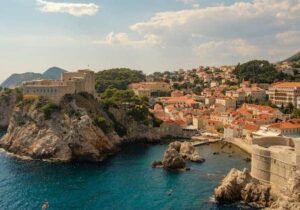
Known for its rich cultural heritage, it offers a blend of Mediterranean and Slavic influences. Croatia’s tourism, agriculture, and maritime industries contribute significantly to its economy.
Property owners in Croatia don’t pay an annual property tax. However, there is an exception for owners of holiday homes, where the property tax is more ceremonial than anything meaningful.
Liechtenstein

Despite its small size, Liechtenstein enjoys a prosperous economy, picturesque Alpine landscapes, and a constitutional monarchy led by the Prince of Liechtenstein.
One of the smallest countries in the world, Liechtenstein includes rental income in the income tax base, effectively eliminating property tax. However, the income tax bracket ranges from 3.2% to 17%.
Monaco

It’s one of the world’s wealthiest and smallest nations, known for its tax haven status. Monaco’s stunning Mediterranean coastline and opulent lifestyle make it a magnet for the affluent.
One of the main benefits of getting Monaco residency is to enjoy the country’s favorable tax system. Indeed, many foreigners acquire tax residency in Monaco due to its zero-income tax policy. Monaco residents (unless they are French citizens) are not subject to personal income tax, investment income, capital gains tax, dividends, or directors’ fees.
Moreover, Monaco is a European country with no wealth tax, no local tax, and no property tax. In addition, direct family members are not subject to gift, or inheritance tax.
Malta

Malta is a tax haven, making it an appealing destination for enterprises and people seeking a tax-friendly environment. Malta might be an attractive alternative for individuals wishing to create an offshore presence due to its expedited company registration procedure, access to the EU market, and English-speaking workforce. There is also no yearly property tax.
The Malta Permanent Residence Program (MPRP) is a residency by direct investment program that enables successful applicants to obtain a Certificate of Maltese Residence, entitling them to reside in Malta with their family members indefinitely. This investment route for residency is ideal for individuals with enough capital assets looking to enhance their mobility and quality of life.
Georgia

It has a rich cultural heritage and a history influenced by various civilizations. Georgia’s economy is driven by agriculture, tourism, and emerging industries like IT and renewable energy.
The country just south of Russia has no property tax, but you do have to pay a tax when the income generated from the property is more than $14,800. And even then, the tax is usually no more than one percent of the property value.
Oceania
Fiji

It comprises over 300 islands and is famed for its vibrant coral reefs.
Tourism and agriculture, particularly sugar and fisheries, are vital to Fiji’s economy. The country has a diverse cultural heritage and is known for its warm hospitality.
Cook Islands
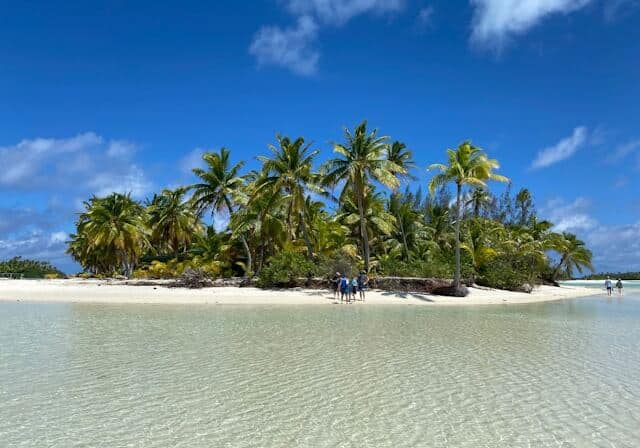
Comprising 15 islands, it offers picturesque beaches, lagoons, and vibrant marine life. Tourism is a key economic driver, along with offshore banking and agriculture. The Cook Islands maintain a unique Polynesian culture and have a strong sense of cultural identity.
The Cook Islands, in the South Pacific Ocean, imposes no property taxes, and nonresidents are taxed only on their income from sources in the Cook Islands. However, there are taxes payable on other incomes, such as profits or gains derived from a business, salaries, rents, interests, dividends and annuities.
Vanuatu
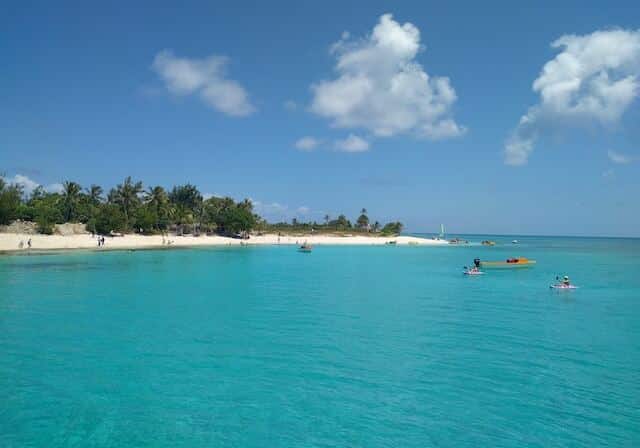
Also referred to as the Vanuatu Citizenship by Investment Program (also formally known as the Development Support Program), it’s one of the fastest and most straightforward ways to acquire a second passport.
While Vanuatu’s citizenship program isn’t the cheapest option, it certainly is one of the easiest ways to get citizenship, with relatively few investor requirements. Owning a Vanuatu passport is particularly rewarding for private individuals looking for some peace and quiet.
A key benefit of the Vanuatu citizenship program is that if you decide to live there full-time, you don’t need to pay Vanuatu taxes on your worldwide income, plus no tax on personal income, inheritance or gifts.
Caribbean Region
Cayman Islands
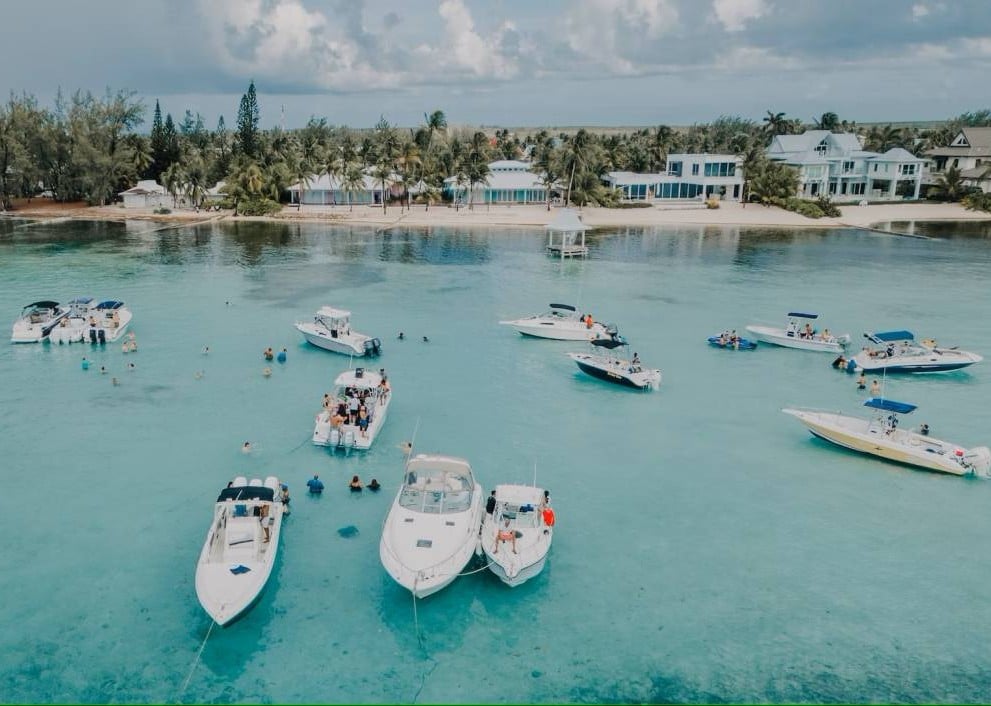
The islands have no direct taxes on individuals or corporations. This, along with strong financial services, contributes significantly to the local economy.
The Cayman Islands are regarded as a tax haven due to their absence of corporate tax, making them an attractive location for multinational corporations to establish subsidiary entities and potentially reduce their tax liabilities. Additionally, the Cayman Islands do not levy taxes on its residents, which means there are no income taxes, property taxes, capital gains taxes, payroll taxes, or withholding taxes.
Dominica
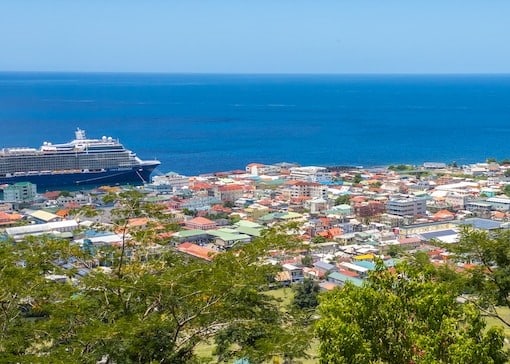
Agriculture, particularly bananas and citrus, is vital to its economy. Dominica is recognized for its friendly people and commitment to environmental conservation.
Dominica serves as a pristine tax haven with no imposed income, corporate, or capital gains taxes on earnings generated overseas. This extends to no withholding taxes, estate taxes (including inheritance and gift taxes), property taxes, and exemptions from stamp duty on asset transfers for offshore companies and trusts.
Regardless of nationality, individuals can establish offshore corporations in Dominica. The country enforces robust privacy laws safeguarding the identities of owners and directors of these companies incorporated in Dominica.
You can also obtain Dominican Citizenship by Investment through purchasing property. This investment route demands that you invest at least $200,000 in government-approved real estate. Most of the options available are shares in high-end tourist accommodation.
The properties can be resold after three years, or five years if the buyer is also an applicant for the Dominica citizenship program. For this option, there are also government fees, which value depends on the number of family members included in the application.
Turks and Caicos

The islands offer a blend of luxury resorts and natural beauty, making them a popular destination for travelers seeking both relaxation and adventure.
Grenada

However, if you own agricultural land as part of a working farm, there is no property tax on the land or any buildings on it.
In the event that the agricultural land is standing idle, there is no property tax on the value of any buildings but there is a 0.2 percent tax on the land.
Asia & The Middle East
United Arab Emirates

While its economic rise was originally driven by oil exports, the country has successfully diversified into sectors such as luxury retail, technology, and hospitality, all while preserving its rich cultural heritage and architectural icons.
Foreign nationals who invest in real estate in the UAE may qualify for the UAE Golden Visa, a long-term residence permit valid for ten years. To apply, investors must provide an official letter from the Department of Land and Property in the relevant Emirate confirming ownership of one or more properties valued at a minimum of AED 2 million (approximately $545,000 USD).
The purchase of a property can be made with a loan of no more than 50 percent of the property’s value from specific local banks approved by the competent local entity. A Dubai Golden Visa for real estate investors provides a ten-year residency visa.
Bahrain
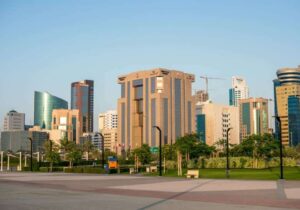
It is a financial and commercial hub in the Middle East. Bahrain’s economy is diversified, with sectors including finance, tourism, and oil refining.
The country offers a blend of cultural attractions, modern amenities, and a vibrant business environment. It is also among the several Middle Eastern countries without property taxes.
Kuwait

It is known for its vast oil reserves and its significant contribution to global energy markets. Kuwait has a high standard of living and a well-developed infrastructure.
The economy is heavily reliant on oil exports, but there are efforts to diversify into other sectors like finance and real estate. For property owners in Kuwait, the annual property tax is zero.
Oman

Oman has a rich cultural heritage and a history of maritime trade.
The economy is driven by oil exports, but efforts to diversify into tourism, manufacturing, and logistics are underway. Oman is known for its warm hospitality and preserved natural beauty, and homeowners don’t pay any real estate taxes.
Saudi Arabia

The country is undergoing diversification efforts, aiming to reduce its dependence on oil and develop other sectors like tourism, entertainment, and technology.
Saudi Arabia is known for its cultural significance and rich heritage. The wealthy Middle Eastern nation is also one of the Gulf countries where owning property will incur no property taxes.
Common Taxes in Countries Without Property Tax

So, even in countries where there is no annual property tax, real estate investors should anticipate paying other taxes and fees.
These one-time or occasional charges can still impact your investment returns, particularly during initial property transactions or upon generating income from your assets.
Property transfer tax or stamp duty
Most countries without annual property tax still charge a transfer tax or stamp duty at the time of purchase. This is a one-time fee based on the property’s sale price and typically it ranges from 2% to 10%.
Capital gains tax
If you sell a property for a profit, you may be subject to capital gains tax. Some no-property-tax countries, such as the Cayman Islands, are also countries with no capital gains tax, while others apply this tax depending on residency status, length of ownership, or use of the real estate.
Rental income tax
If you plan to rent out your property, rental income tax may apply. Rental income tax rates can vary widely and may be influenced by whether you are a resident or non-resident, or if the real estate is zoned as commercial or residential.
Wealth or municipal taxes
In rare cases, countries may charge alternative taxes such as wealth tax or municipal service fees in lieu of traditional property tax. These are generally low or non-existent in tax-friendly countries but should still be factored into due diligence.
Pros and Cons of Buying in a Country with No Property Tax
Investing in international real estate in a country with no property tax can offer major financial and strategic advantages, but it’s important to weigh the benefits against potential risks and limitations.
Pros
- Lower holding costs: No recurring property tax means lower annual expenses, particularly beneficial for long-term investors and owners of multiple properties.
- Increased net yields: With fewer tax deductions, income from rental properties or capital gains is less diluted—especially in high-demand, low-supply markets.
- Favorable tax planning: Many of these jurisdictions double as offshore financial centers or offer residency and citizenship by investment programs, making them ideal for global tax optimization.
- Simplicity: Avoiding complex annual valuations or reassessments streamlines ownership and reduces compliance burdens.
Cons
- Higher once-off fees: While annual property tax may be absent, stamp duty or transfer taxes can be substantial upfront.
- Hidden fiscal risks: Some countries may change tax policies with little notice, especially if they rely heavily on foreign real estate investment.
- Limited infrastructure: Certain low-tax jurisdictions may have underdeveloped public services or real estate markets that lack transparency.
- Foreign ownership restrictions: In some cases, non-citizens face limits on buying land or must go through additional legal procedures.
Frequently Asked Questions about Countries with No Property Tax
Why do some countries not charge property tax?
Countries without property tax often rely on alternative sources of revenue, such as transfer taxes, stamp duties, or indirect taxation like VAT or rental income tax.
Many of these countries have small economies or are tourism-driven nations that use real estate to stimulate foreign investment without placing ongoing burdens on property ownership.
Is it legal to buy real estate in a country with no property tax as a foreigner?
Yes, in most countries without property tax, foreign investors are legally allowed to purchase real estate. However, you may still be subject to property transfer taxes, capital gains tax, or rental income tax depending on your use of the property and local laws.
How do countries without property tax generate revenue?
Instead of levying annual property taxes, these countries may collect revenue through:
- One-time property transaction fees like transfer taxes
- Rental income taxes on income-generating properties
- Tourism taxes, VAT, or corporate income tax
This approach helps maintain a tax-friendly image while still funding essential services.
Are there hidden fees or other taxes to watch for in no-property-tax countries?
Yes, even if a country does not impose annual property tax, you may still encounter:
- Property transfer tax when buying real estate
- Capital gains tax when selling the property
- Rental income tax if you lease it out
- Stamp duty or municipal fees depending on location
What are the pros of investing in countries without property tax?
No annual property tax reduces long-term property ownership costs. It is ideal for real estate investors seeking passive income from rental properties and there are fewer ongoing obligations for property owners.
What are the cons of investing in countries without property tax?
Some countries may have high property transfer tax or stamp duties to make up for no property tax. There’s also the potential for high capital gains tax on resale. The country may have fewer public services funded through municipal taxes.
Do I still have to pay capital gains tax in countries with no property tax?
Yes, many countries that don’t levy an annual property tax may still impose a capital gains tax when you sell your property.
The rate and conditions depend on local laws, holding period, and whether the property is a primary residence or investment asset.
Is rental income taxed in countries without property tax?
In some cases, yes. Even if a country has no property tax, rental income generated from owning real estate may still be subject to rental income tax.
Rates vary by country and tend to depend on whether you are a resident or non-resident.
What is property transfer tax and when is it paid?
Property transfer tax (also known as stamp duty) is a one-time fee paid during property transactions, typically by the buyer. It is separate from annual property taxes and is calculated as a percentage of the property’s sale price.
Are there personal income taxes in countries with no property tax?
Yes, some countries with no property tax may still levy personal income tax on wages, business profits, or rental income. It’s important to review the full tax regime, not just taxes related to real estate, when evaluating how tax-friendly a country is.


